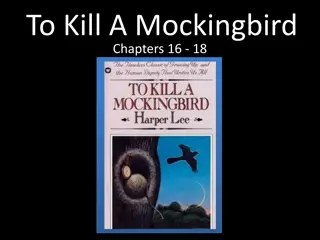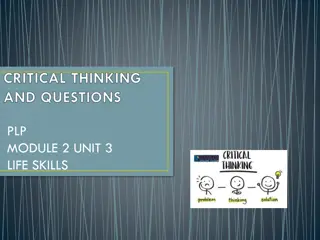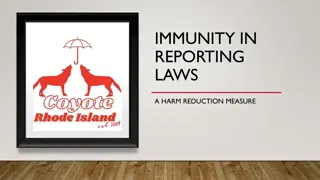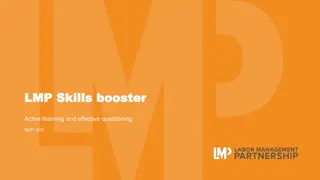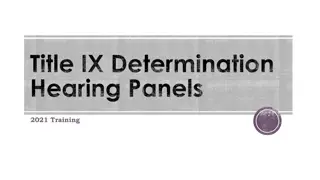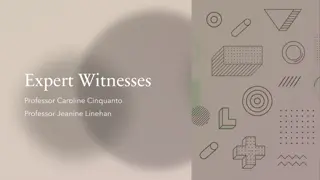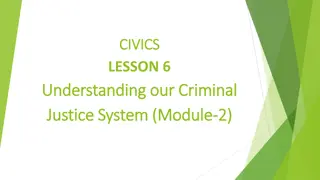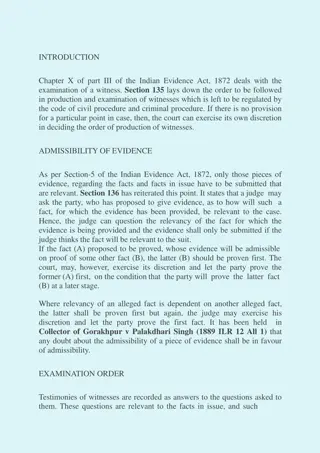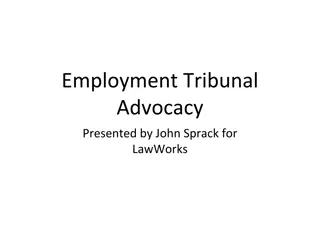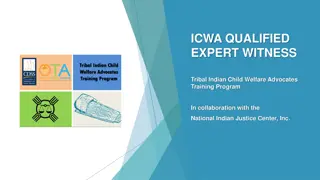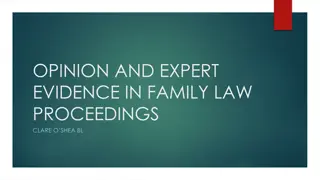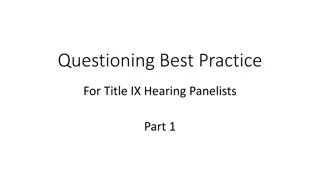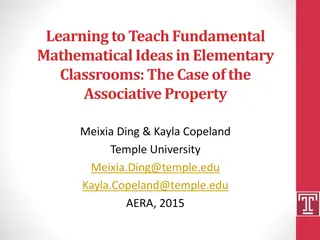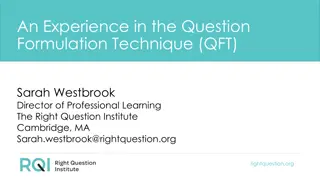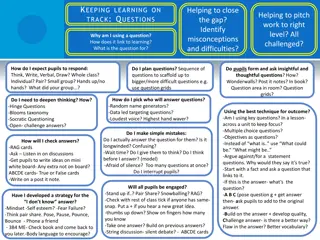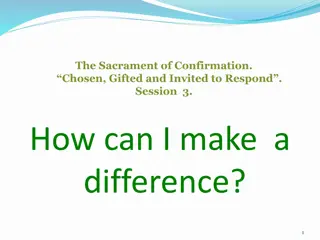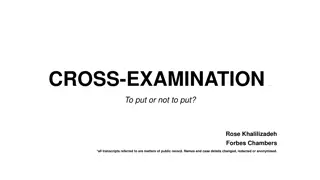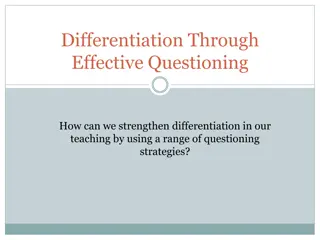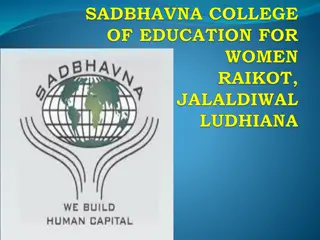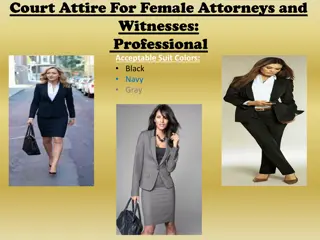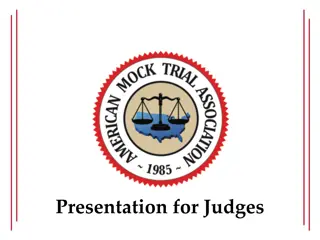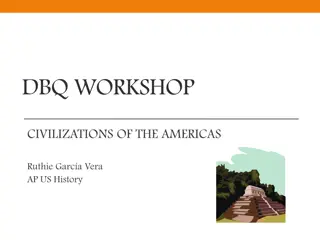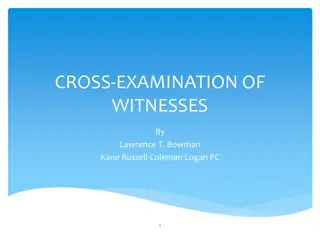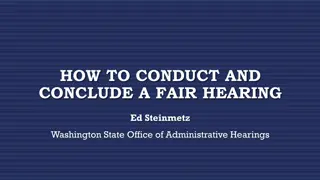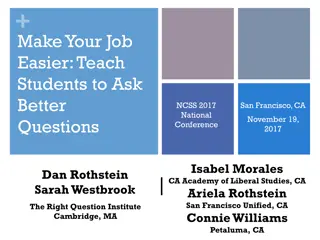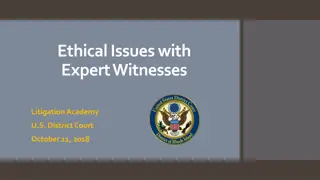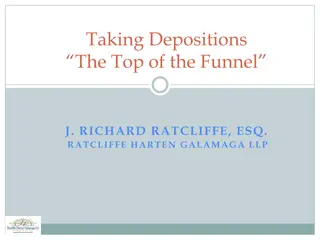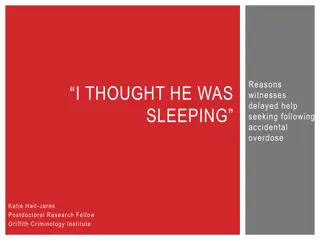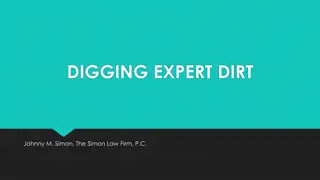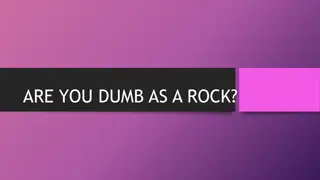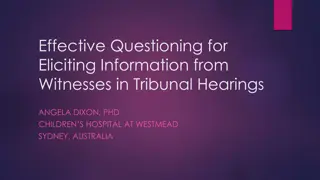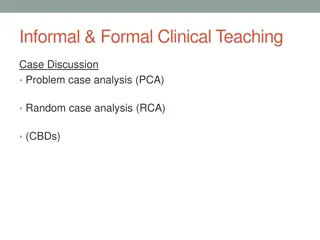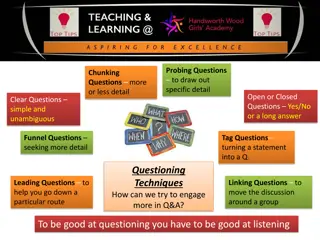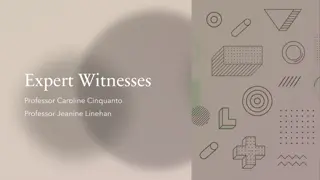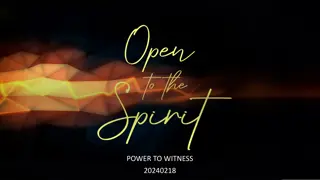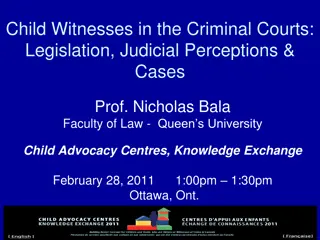Trials and Testimonies in Chapters 16-18 of "To Kill a Mockingbird
The narrative unfolds as witnesses take the stand in Tom Robinson's trial. The chapters delve into the aftermath of the mob incident, highlighting the testimonies of Mr. Tate, Mr. Ewell, and Mayella. Atticus's meticulous questioning reveals inconsistencies, challenging the credibility of the witness
0 views • 4 slides
Enhancing Critical Thinking Skills Through KWHL Chart
Critical thinking entails questioning and seeking more information before accepting ideas. The KWHL chart method is introduced to improve critical thinking skills, encouraging students to note what they know, what they want to learn, how they can learn more, and what they have learned. Engaging in a
0 views • 5 slides
Understanding the Importance of Immunity in Reporting Laws
Immunity in reporting laws is a critical harm reduction measure that allows sex workers, trafficking survivors, and certain crime witnesses to report incidents to police without facing arrest or charges. By providing immunity, advocates aim to mitigate the harms of anti-prostitution laws, facilitate
0 views • 6 slides
Enhancing Communication Skills Through Active Listening and Effective Questioning
Explore the importance of active listening and effective questioning in communication. Learn strategies to show you're listening, even virtually. Discover the benefits of an active listening mindset and how to overcome barriers to listening effectively in various environments.
4 views • 33 slides
Title IX Determination Hearing Panels 2021 Training
Understanding the process and standards involved in Title IX determination hearing panels is crucial for a fair and impartial outcome. The training covers key aspects such as grievance policy review, standard of proof, evidence consideration, questioning witnesses, relevancy, and more. It emphasizes
0 views • 11 slides
Understanding Expert Witness Testimony in Legal Proceedings
Explore the role of expert witnesses in legal cases, including the laws governing their testimony such as FRE 701, FRE 702, and FRE 703. Dive into the factors influencing the reliability of expert testimony, sample voir dire procedures, expert opinions, and cross-examination techniques. Learn from p
0 views • 21 slides
Understanding the Criminal Justice System and Legal Procedures
The D.K. Basu guidelines lay down specific requirements for the arrest, detention, and interrogation of individuals by the police in India. These guidelines include the need for clear identification of police officials, preparation of arrest memos with witnesses, and the right of the arrested person
0 views • 14 slides
Examination of Witnesses under Indian Evidence Act, 1872
Chapter X of Part III of the Indian Evidence Act, 1872, outlines the process of examining witnesses, including the order of production and admissibility of evidence. Sections 135 to 141 delve into the rules governing the examination-in-chief, cross-examination, and re-examination of witnesses, empha
2 views • 8 slides
Strategies for Effective Tribunal Advocacy in Employment Cases
Practical guidance on preparing for and presenting a case at an Employment Tribunal, covering disputed legal and factual issues, persuasion tactics, witness preparation, dealing with opposing witnesses, hearing procedures, and effective questioning techniques, all illustrated with images for better
0 views • 17 slides
Tribal Indian Child Welfare Advocates Training Program
This training program focuses on qualifying expert witnesses in Indian Child Welfare Act (ICWA) cases, covering topics such as the role of expert witnesses, tribal sovereignty, and ethical responsibilities. It aims to enhance the understanding and application of ICWA provisions for tribal social wor
1 views • 63 slides
Expert Opinion and Evidence in Family Law Proceedings
In family law proceedings, witnesses are generally not allowed to give opinions unless they are experts in their field. The Exclusionary Rule prohibits witness opinions to ensure the reliability of evidence presented before the court. However, there are exceptions to this rule, such as expert witnes
0 views • 32 slides
Strategies for Effective Questioning in Title IX Hearings: Part 1
Learn evidence-based questioning strategies to engage parties and witnesses effectively in Title IX hearings. This includes creating a questioning plan, practicing empathy, cultivating rapport and cooperation, active listening, addressing discrepancies, and avoiding unproductive techniques. Utilize
0 views • 15 slides
Unpacking the Associative Property of Multiplication in Elementary Classrooms
This study delves into how prospective teachers transform learned specialized content knowledge from professional development to elementary classrooms, focusing on the associative property of multiplication. The research explores the process of unpacking worked examples through representation uses a
1 views • 19 slides
Enhancing Learning Through Question Formulation Technique (QFT)
Sarah Westbrook, Director of Professional Learning at The Right Question Institute, explores the importance of teaching question formulation skills. The session covers the benefits of QFT in collaborative learning, real classroom examples, and why questioning is crucial now. Learn how to access free
0 views • 84 slides
Strategies for Effective Questioning and Student Engagement in Learning
This detailed guide explores various questioning techniques and strategies to enhance student engagement, identify misconceptions, and close learning gaps. It covers methods to scaffold questions, encourage insightful inquiries, utilize response systems, and develop critical thinking skills. The con
0 views • 12 slides
Embracing the Call to Be Witnesses in Confirmation Journey
Through the sacrament of Confirmation, we are empowered by the Holy Spirit to be witnesses of our faith. This session delves into the significance of being chosen, gifted, and invited to respond. The journey involves prayer, self-reflection, and a commitment to honesty, courage, and doing what is ri
0 views • 18 slides
Mastering Cross-Examination in Legal Proceedings
Explore the essentials of effective cross-examination techniques in legal settings through guidelines, pitfalls to avoid, and examples of handling multiple witnesses and conflicting statements. Learn the art of questioning, listening, and strategic presentation to bolster your case.
0 views • 13 slides
Strengthening Differentiation Through Effective Questioning Strategies
Strengthening differentiation in teaching through a range of questioning strategies is crucial for promoting deeper thinking and engagement among students. By encouraging more questions and focusing on the process of inquiry, educators can ignite curiosity, creativity, and critical thinking skills.
0 views • 23 slides
Effective Questioning Techniques in Teaching
Techniques involved in effective questioning in teaching include asking questions to the whole class, proportionate distribution of questions, providing wait time for students to answer, sequencing questions from simple to complex, and avoiding excessive questioning. It is important for teachers to
1 views • 11 slides
Court Attire Guidelines for Attorneys and Witnesses: Professional Dress Code
Court attire recommendations for female attorneys and witnesses include wearing professional suits in black, navy, or gray, with clothing items like suit jackets, dresses, pants/skirts, tops, hosiery/trouser socks, and pumps/flats. For male attorneys and witnesses, the attire consists of suits, jack
0 views • 5 slides
Court Attire Guidelines for Attorneys and Witnesses: Professional Dress Code
Female attorneys and witnesses should wear professional suits in black, navy, or gray, along with appropriate clothing items like suit jackets, dresses, pants/skirts, dress tops, hosiery/trouser socks, and pumps/flats. Male counterparts should opt for suits, jackets, dress pants, collared/button-dow
0 views • 5 slides
Participating in a Mock Criminal Jury Trial Competition
In this competition, students simulate a criminal jury trial where they take on roles as attorneys and witnesses in a fictitious jurisdiction called Midlands. This year's case involves State v. Sinclair, focusing on the murder trial of Skyler Sinclair, a suspect in the death of an undercover officer
0 views • 22 slides
History Essay Writing Tips and Questioning Levels
Learn the levels of questioning for essay writing: Recall, Analysis, and Synthesis. Discover essential tips for writing history essays, including thesis statements, using evidence, and avoiding common mistakes. Understand different question modes and how to structure your arguments effectively.
0 views • 35 slides
Mastering Cross-Examination of Witnesses in Legal Settings
Delve into the art of cross-examination with insights from Lawrence T. Bowman and Kane Russell Coleman Logan PC. Explore the power of cross-examination in uncovering truth, the competitive nature of trials, and the distinction between discovery depositions and trial cross-examination. Learn how to e
0 views • 41 slides
How to Conduct and Conclude a Fair Hearing with Ed Steinmetz
A comprehensive guide on conducting a fair hearing, covering key steps such as prehearing explanations, opening statements, handling exhibits, managing witnesses, and ensuring orderly testimony from each witness. The guide emphasizes creating a level playing field, allowing parties to participate, a
0 views • 24 slides
Enhancing Learning Through Better Questioning Techniques
Empower educators to boost student learning by teaching effective questioning skills at the NCSS 2017 National Conference. Learn about the Question Formulation Technique (QFT), explore classroom applications, delve into new learning models, and engage in collaborative activities for enhanced student
0 views • 87 slides
Understanding Ethical Issues with Expert Witnesses in Litigation
This article discusses ethical considerations related to expert witnesses in litigation, highlighting the differences in roles between lawyers and experts. It emphasizes the importance of truthfulness and independence for expert witnesses, along with their qualifications and the sources they may rel
0 views • 13 slides
Practice and Procedure in Judicial Review: Factual Evidence and Interveners
The content provides valuable insights into the practice and procedure regarding factual evidence and interveners in judicial review cases. It covers general rules, recent cases, applications for oral evidence, questioning witnesses, opinion evidence, and the role of interveners. Key points include
0 views • 28 slides
Mastering the Deposition Process for Legal Professionals
Discover the ins and outs of taking or defending depositions with expert advice on preparation, questioning techniques, and maximizing the deposition experience. Learn why depositions are crucial in building a strong legal case, uncovering new information, and testing theories. Gain insights into us
0 views • 15 slides
Delays in Seeking Help Following Accidental Overdose: Understanding Witnesses' Perspectives
Exploring the reasons behind witnesses delaying help-seeking after an accidental overdose, this study by Katie Hail-Jares delves into incarceration, loss of tolerance, social support systems, and witness behavior. It highlights the challenges of witness reporting in substance use settings and the im
0 views • 19 slides
Expert Strategies for Leveraging Expert Witnesses in Litigation
Uncover expert tactics for securing a favorable outcome in legal cases by harnessing the power of expert witnesses. Learn how to research, assess, and utilize expert testimony effectively to strengthen your case. Embrace modern tools and methodologies to strategically frame your arguments and boost
0 views • 26 slides
Understanding the Symbolism of Rocks in Biblical Context
Exploring the significance of rocks in the Bible, this content delves into the metaphorical meaning of stones as reminders of God's faithfulness and as witnesses to His mighty works. Drawing from verses in Joshua and Numbers, the concept of rocks serving as witnesses and sources of nourishment is hi
0 views • 21 slides
Effective Questioning Techniques in Tribunal Hearings
Effective questioning techniques are crucial in tribunal hearings to elicit accurate information from witnesses. Angela Dixon, Ph.D., emphasizes the importance of asking the right questions to engage participants and achieve optimal outcomes. Communication barriers, competency areas, and strategies
0 views • 32 slides
Effective Clinical Teaching Strategies and Questioning Techniques
This content discusses informal and formal clinical teaching methods, case discussion, problem case analysis, constructivism, learning from experience, and the importance of questioning in clinical settings. It emphasizes learning through experience and transforming knowledge, with a focus on creati
0 views • 9 slides
Effective Questioning Techniques for Engaging Discussions
Explore the art of effective questioning techniques to enhance discussions through probing, chunking, clear and ambiguous questions, funnels, leading questions, and more. Learn how to foster engagement through active listening and structured questioning approaches for dynamic communication.
0 views • 5 slides
The Resurrection of Jesus: A Momentous Event
The resurrection of Jesus is portrayed through the accounts of the evangelists, highlighting the disbelief of the disciples and the eventual acceptance of this miraculous event. The chronology and memorial of this significant occurrence are discussed, emphasizing the realness of Jesus' resurrection
0 views • 11 slides
Understanding the Role of Expert Witnesses in the Legal System
Delve into the pivotal role of expert witnesses such as Professor Caroline Cinquanto and Professor Jeanine Linehan in legal proceedings. Explore the applicability of laws such as FRE 701, 702, 703, 705, and Rule 704 in determining the qualifications and reliability of expert testimony. Gain insights
0 views • 21 slides
Empowered Witnesses: Embracing the Power of the Holy Spirit
Delve into the transformative journey of becoming empowered witnesses for Jesus through the guidance of the Holy Spirit. Explore the essence of being bold in faith, prepared to share the hope within you, and the significance of God's power in shaping your testimonies. Let the teachings from Acts res
0 views • 13 slides
Child Witnesses in Criminal Courts: Legislation & Judicial Perceptions
Prof. Nicholas Bala discussed legislation and judicial perceptions regarding child witnesses in the criminal courts, focusing on Bill C-2 amendments, competency inquiries, the Canada Evidence Act, and survey findings on child competency. The presentation highlighted changes in the legal framework to
0 views • 38 slides
The Five Witnesses to Jesus in John 5:31-47
Hostility towards Jesus arose as the Jews sought to kill Him for violating the Sabbath, claiming equality with God, duplicating God's works, giving life, executing judgment, and raising the dead. The witnesses to Jesus include Himself, John the Baptist, His works, the Father, and the Scriptures, all
0 views • 13 slides
